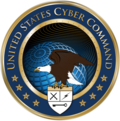Michael Rogers | |
|---|---|
 | |
| 2nd Commander of United States Cyber Command | |
| In office April 3, 2014 –May 4, 2018 | |
| President | Barack Obama Donald Trump |
| Preceded by | Keith B. Alexander |
| Succeeded by | Paul M. Nakasone |
| 17th Director of the National Security Agency | |
| In office April 3,2014 –May 4,2018 | |
| President | Barack Obama Donald Trump |
| Deputy | George Barnes |
| Preceded by | Keith B. Alexander |
| Succeeded by | Paul M. Nakasone |
| Personal details | |
| Born | October 31,1959 Chicago,Illinois,U.S. |
| Political party | Independent [1] |
| Education | Auburn University (BA) Naval War College (MS) |
| Military service | |
| Allegiance | United States |
| Branch/service | United States Navy |
| Years of service | 1981–2018 |
| Rank | Admiral |
| Commands | United States Cyber Command National Security Agency Central Security Service United States Fleet Cyber Command United States Tenth Fleet |
| Battles/wars | Invasion of Grenada Multinational Force in Lebanon |
| Awards | Navy Distinguished Service Medal Defense Superior Service Medal (3) |
Michael S. Rogers (born October 31,1959) is a retired four-star admiral of the United States Navy. Rogers served as the second commander of the United States Cyber Command (USCYBERCOM) from April 2014 to May 2018 while concurrently serving as the 17th director of the National Security Agency (NSA) and as chief of the Central Security Service (CSS). During his tenure,he helped transform and elevate U.S. Cyber Command into a unified combatant command. Rogers relinquished command to General Paul M. Nakasone [2] [3] on May 4,2018 and retired from the Navy a few weeks later on June 1,2018.
Contents
- Early life and education
- Career
- 1980s
- 2000s
- 2010s
- 2020s
- Military decorations
- References
- External links
Prior to 2014,Rogers served as the Commander of the Tenth Fleet and Commander of the United States Fleet Cyber Command,with responsibility for all of the Navy's cyberwarfare efforts. [4] In 2009,he was the director of intelligence for the Joint Chiefs of Staff after having been the director of intelligence for Pacific Command from 2007 onwards.






